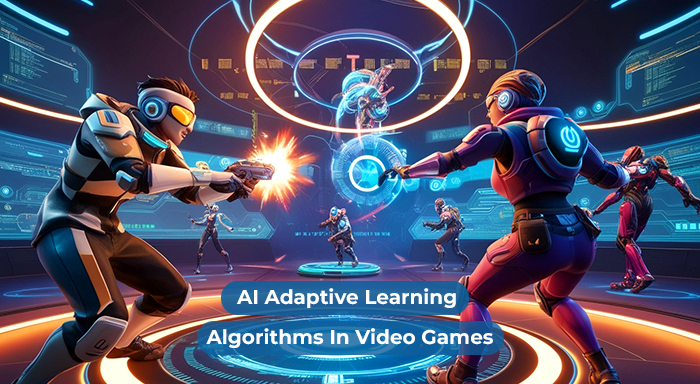One of the digital industries that is developing the fastest is gaming. To advance the sector, developers and experts are always working on new hardware parts, software, and creative concepts. The use of artificial intelligence (AI) in video games is one such innovation that has transformed the gaming industry by improving the player experience.
Not only but also it has made it more immersive and customized. Adaptive learning algorithms, which enable games to react dynamically to player behavior, are among the most fascinating uses of AI. Because of this technology, no two gaming experiences are alike, which makes games more interesting and difficult.
In this article, we will explore how AI adaptive learning algorithms work, their impact on gameplay, and the challenges they introduce. We’ll also look at how these algorithms interact with online communities, such as CS Go betting sites, to encourage more audience interaction and customization.
AI Adaptive Learning: How It Works
As mentioned in the previous paragraph, new technologies are constantly being created and developed in the gaming industry, with AI being one of them. This technology is widely applied in game development and used to enhance the personalization of the gaming environment. At its core, adaptive learning in artificial intelligence involves tracking player behavior and preferences in real time to adjust gameplay elements.
In order to assess and adjust in real-time to inputs like preferred playstyles, in-game choices, and reaction times, specialized algorithms have been developed. Using this information, AI systems fine-tune challenges—such as scaling enemy strength or offering tutorials at the right moment—ensuring that players stay engaged without feeling overwhelmed.
These technologies are also used to give game characters intelligent behavior, making gameplay more interesting by adjusting the environment to the player’s actions. For example, enemies may become stronger based on the player’s progress, or the hero might receive a special quest. This ensures that both beginners and experienced players can equally enjoy the game without frustration from repetitive gameplay or steep learning curves.
Personalization in In-Game Rewards and Ecosystems
Additionally, adaptive artificial intelligence is transforming the in-game economy. Certain video games have the ability to examine player behavior and suggest new challenges, skins, or weapons based on their preferences. An example is the ecosystem in Counter-Strike 2, where csgo gambling and similar platforms play a significant role. By recommending appropriate skins for trading or betting, adaptive algorithms can increase player interest.
For instance, these platforms use AI-powered personalization techniques to offer specific betting odds or promotional deals based on users’ past bets or preferences. On platforms like cs2 gambling sites, players can also support their favorite teams, further enriching their gaming experience.
By customizing each user’s experience, these technologies increase engagement and guarantee that people stay active on the site. These technologies can increase player happiness and promote longer gaming sessions when implemented properly.
The Role of AI in Competitive Games
AI technologies impact not only gaming ecosystems but also competitive video games. Since they can be utilized for matchmaking and guaranteeing fair gameplay, adaptive AI systems are essential in this genre. Esports titles like CS2, Dota 2, and Valorant heavily rely on algorithms to match players of similar skill levels, providing balanced competition.
Without proper matchmaking, games would suffer from uneven experiences, leading to imbalance, frustration, and player churn. Adaptive algorithms also assist developers in tracking player behavior to detect harmful actions and cheating that disrupt the gaming experience.
It is now simpler to keep an eye on and prohibit problematic individuals and accounts thanks to the integration of AI technologies into competitive games. These features keep the sense of competitiveness alive for all players by ensuring fairness for both, in the game and on CSGO skin gambling platforms.
Challenges of AI Adaptive Learning in Games
While adaptive learning algorithms enhance personalization, they also introduce several challenges. One issue is over-personalization, where games become too tailored, removing surprises or unexpected challenges, which can reduce player interest.
Another challenge lies in the imperfection of these technologies. As AI is relatively new, it is still under development and may not function effectively in every scenario. These systems are constantly being improved by developers and experts to increase their dependability and efficiency.
Furthermore, the extensive tracking of player data raises privacy and ethical concerns. The customization of gameplay and player privacy must be carefully balanced by game producers. When adaptive algorithms are used in gambling or betting platforms, such as cs go betting sites, the stakes become even higher. To stop customer data from being misused and to avoid encouraging negative habits through over-personalization, businesses must maintain transparency and ethical principles.
Conclusion
In summary, adaptive learning algorithms powered by artificial intelligence have transformed the gaming industry, offering players a more personalized and engaging experience. These systems accommodate a variety of players while preserving difficulty and excitement through matchmaking, in-game prizes, and dynamic gameplay tweaks.
However, these advancements also bring challenges related to privacy, ethics, and over-personalization that developers must address. In the end, how these technologies grow and how successfully developers strike a balance between innovation and user trust and engagement will determine how successful adaptive AI in gaming is.




